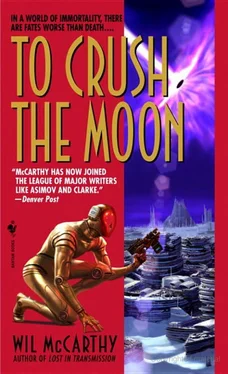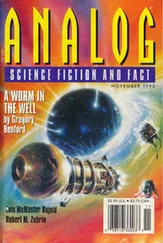“Aye, madam. The Imbrian astronomer Rigby believed there was someone living on Varna.”
“The slowest moon. And also the most distant?”
“Correct, although there was a farther moon in days gone by. And since traffic to Varna ended with the Shattering, any population there was likely to include Olders from the Iridium Days or before. Specifically, Rigby was of the opinion that the group was small—possibly a single individual.”
Understanding blooms in the eyes of the Furies. “This man?” They point at Bruno, studying him closely for the first time.
“I’m called Ako’i,” Bruno tells them. Not a name but a title: Professor.
This prompts some surprise on their parts. “He can speak!” And this is no idle exclamation, for Bruno passed the time on Varna as a kind of sleepwalker, repeating the same few tasks over and over again, day in and day out. Unaware of the passing centuries—unaware of anything, including himself. Beyond his first few weeks on that neutronium island, he can’t remember a single thing until Radmer’s arrival.
Indeed, until a few hours after that, for the sleepwalking did not immediately subside. He had spoken—even held fragmentary conversations—but either his brain’s neocortex had not fully engaged, or else its hippocampus had been sluggish about laying down new memories. “Neurosensory dystropia,” they called it. Or “maroon sickness,” or “zombitis,” which wasn’t even a proper word. In extreme cases it was irreversible.
In declining that final trip from Varna to the chaos of an overpopulated Lune, Bruno had been trying, in a way, to draw an end to his long life. But he hadn’t really understood what awaited him. Now the image makes him shudder: the “indeceased,” wandering like animate ghosts, wearing grooves in the countryside with their feet. According to Radmer, whole villages had been known to succumb, going blankly through the motions of life until their crops eventually failed and they starved.
“I can reason,” he assures the Furies. “Though perhaps not well.”
They study him some more, furrowing and clucking. “Radmer, dear, this is a season of ill omens. The sun has been kicked twice, fair Nubia has fallen, and rather than fleeing, or pledging your sword to our defense, you’ve brought us an old man. Your ways have always been strange—since the world’s very creation, we’re told—but this is truly baffling. What do you seek from us?”
“The sun has been kicked?” Bruno repeats, wondering what such a thing could mean.
“A metaphor for eclipse,” says Radmer. “Murdered Earth transits the sun, which appears to explode and then re-form. Lesser kickings occur when one of the other murdered planets passes in front of something.”
“Ah,” Bruno says, for he has seen that sight himself, long ago. To the Furies he says, “But that’s a matter of clockwork, yes? Not an omen, but a happenstance of whirling bodies.”
“So our ministers inform us,” says the oldest of the Furies, as though it’s a matter of little consequence. “But we face extinction. Nubia has been stripped of metal, and is it coincidence that the metal armies which razed it have since doubled in size? The reports we have from that lost republic are as terrifying as they are sparse. Mass starvation, mass enslavement. In the face of that, everything is an omen.”
“We’re here to help,” Radmer assures her. “This man is possibly the oldest living person, and his knowledge of Queendom technology is unsurpassed, easily dwarfing my own.”
“That’s wonderful,” says Danella Mota, “except that we have no Queendom technology. The city’s last wellstone is buried in the dumps, for we were unable to make it work.”
“If that’s so,” Bruno says to her, “you should exhume it and allow me to make blitterstaves of the material. It isn’t difficult, and it would improve your defensive position enormously. With care, every square meter of rubble can be fashioned into twenty weapons.”
This comment gains him the Furies’ full attention.
“Ah, yes,” says Radmer, though surely the idea is obvious to anyone who has been both an architect and a general. And a matter programmer.
“Don’t patronize me,” Bruno tells him. Then, to the Furies: “How much intact material can you salvage? The deconstruction needs to have been performed in particular ways, to avoid damage to the nanofiber weave that produces the pseudoatoms.”
That goes a bit over their heads, but they are persuaded nevertheless, and in short order a courier is sent out to order an immediate excavation of the city dumps.
“So,” says Pine Chadwir to Radmer, with half an eye on Bruno, “this ancient vessel still holds a bit of wine. You have our thanks, General. Does he do anything else?”
Radmer forms an embarrassed half smile. “Actually, I had something quite different in mind, and with your permission I’ll soon remove this man from Timoch altogether.”
“Yes?” says the eldest Fury skeptically. “Our would-be savior? And where exactly would you bring him?”
“The Stormlands,” Radmer says. And everyone in the room seems to gasp in surprise, then slowly nod in agreement.
Soon they’re in a different room whose decorations consist mainly of dead robots crucified on the walls. The human beings—and the Olders—are all standing around a table whose surface is a map of the country. It’s rather misleading, Bruno thinks, because Imbria covers almost half of the northern hemisphere, and stretching it out flat produces eerie distortions in the squozen moon’s once-familiar features. Fortunately, a large globe hangs above the table for reference, and another one sits on the floor behind it in a two-axis mechanical spin platform that would have been perfectly at home in the Old Girona of Bruno’s youth.
The table is dotted with chessmen—mirror-shiny for the Glimmer King’s armies, blue for Imbria’s, and red for the tattered, fleeing remnants of the armies of Nubia. The planette’s Olders are apparently too few and scattered to merit chessmen of their own, but if they ever find their way to this table, Bruno has no doubt they will be some weary shade of gray.
Anyway, at a glance he can see just how badly the war is going; two southern cities—labeled Renold and Bolo—are staring already into the faceless faces of the approaching enemy, and if the robots march by night as well as by day (and why wouldn’t they?), the sites will be under siege by midnight, and likely demolished before sunrise, just over sixty hours from now. These sunset rays slanting through the slatted windows might be the last daylight the two cities will ever see.
Meanwhile, a third branch of the robot army is streaming northward between the two, aiming for the city of Tosen and, one hundred fifty kilometers beyond it, the capital city of Timoch itself. The Imbrian Sea—a bit larger than in Bruno’s day—fills a basin just west of Timoch, stretching northward to the Mairan Shelf and west to the Stark Hills in a rough triangle three hundred kilometers on a side, covering the middle third between the planette’s equator and the north pole.
And chillingly, there are at least a dozen smaller silver chessmen—the Glimmer King’s scouting patrols—scattered all the way from Imbria’s border to the southern shore of its sea. The only saving grace—the only thing that keeps it from looking like certain doom—is the fact that the bulk of the robot army is still in Nubia, in Lune’s southern hemisphere, and does not appear on this map at all. But even Bruno can sense the mass of them down there, implicit in the northward-streaming formations.
“How accurate are these unit positions?” he murmurs to Radmer.
“Very. Cover the nation in hundred-kilometer circles and you’ll find a watch tower on the highest points of each, with dozens more running through the passes and lowlands in-between. During daylight hours, everything that moves is tracked with great precision.”
Читать дальше












